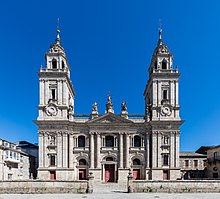Lugo Cathedral
| Saint Mary's Cathedral | |
|---|---|
 |
|
| Basic information | |
| Location | Lugo, Galicia, Spain |
| Geographic coordinates | 43°00′33″N 7°33′30″W / 43.0092°N 7.5583°WCoordinates: 43°00′33″N 7°33′30″W / 43.0092°N 7.5583°W |
| Affiliation | Roman Catholic Church |
| Country | Spain |
| Architectural description | |
| Architect(s) | Raimundo |
| Architectural type | Church |
| Architectural style | Romanesque (Gothic, Baroque, Neoclassical) |
| Groundbreaking | 1129 |
| Spire(s) | 2 |
| Official name: Catedral de Santa María | |
| Type | Real property |
| Criteria | Monument |
| Designated | 3 June 1931 |
| Reference no. | (R.I.) - 51 - 0000708 - 00000 |
Saint Mary's Cathedral (Galician: Catedral de Santa María), better known as Lugo Cathedral, is a Roman Catholic church and basilica in Lugo, Galicia, north-western Spain. The church was erected in the early 12th century in a Romanesque style, with Gothic, Baroque and Neoclassicist elements.
A church existed in the site from 755. In 1129 Bishop Peter III commissioned a new edifice in the latest architectural style from Raimundo, a local architect and builder. This Romanesque structure was completed in 1273.
Later renovations and restorations added elements in other styles, such as the Renaissance retablo at the high altar. It was destroyed in the 1755 Lisbon earthquake and fragments of it are housed in the church.
The cathedral received from the Pope the privilege to permanently expose the Holy Sacrament.
The cathedral is on the Latin cross plan, with a length of 85 m. It has a nave, covered by a barrel vault, and two aisles, with an ambulatory and five apse chapels. The triforium features triple ogival mullioned windows. The apse houses a calvary sculpture from an unknown date.
The façade is a Renaissance design by Julián Sánchez Bort inspired by a plan proposed by Ventura Rodríguez for the Cathedral of Pamplona. Its construction was finished in the late 19th century, with the completion of the two side towers.
...
Wikipedia
